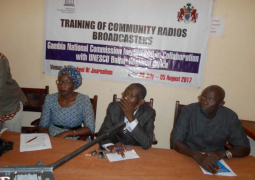Officials and other stakeholders of the agricultural sector are currently on a two-day agricultural statistical user and producer forum, in collaboration with partners, for data needs and funding support towards the forthcoming integrated agricultural census.
Organised by the Department of Planning Services Unit under the Ministry of Agriculture, the forum, held at the Ocean Bay Hotel on Wednesday and Thursday, enhanced the capabilities and capacities of the national statistical agencies in The Gambia for collecting, processing, analysing and disseminating food and agricultural data in the country.
The forum also brought together the users, planners, policymakers, administrators of agricultural statistics, producers, and statistical agencies to work out a prioritised list of data needs in the agricultural sectors as well as reviewing the quality and adequacy of existing data set.
The producers forum aimed at bringing together the various agencies involved in data production to harmonise their programme and collaborate in the work as well as to prepare the basis for drawing up a minimum programme for the production of agricultural statistics based on the needs that have been identified.
In his welcoming remarks, the director general of the department of agriculture, Sait Drammeh, said the objective of the forum was to bring stakeholders together, particularly data producers and consumers to determine the most relevant data needed for prudent planning and decision for the agricultural sector.
The director general further thanked, on behalf of the government, the FAO and the other UN bodies for their continued support to the planning service unit, the Ministry of Agriculture for their contribution to the Technical Cooperation Programme signed on 24 January 2011.
In declaring the forum open, the permanent secretary at the Ministry of Agriculture, Babucarr Njie, said: “This forum is a rare opportunity which comes once in every ten years. This forum therefore, is where one can fully explore your interest in the type of data and parameters required for the providers to take them on board questionnaires for collection during the imminent integrated Agricultural Census.”
He added that the integrated nature of the census means that various institutions, ministries and departments under the Agriculture and Natural Resources sector are given equal opportunity in the exercise.
These institutions and departments are deemed critical in the provision, utilization and management of various agricultural needs for the formulation of sound policies that respond to the government new strategy of economic growth and development - PAGE.
Also speaking at the forum, FAO representative in The Gambia, Dr Babagana Ahmadu, said: “This project will be implemented under the UN joint programme between the FAO, the UNDP and the WFP, in collaboration with the CFTC and the Government of The Gambia.”
The FAO rep added that the project will be operating within the UN initiative, which is aimed at building the capacity of government institutions for good governance and economic management.
“This project should address technical problems in the field of agriculture, fisheries, forestry and rural livelihood that prevent member countries, either individually or collectively, from implementing their development programmes,” Dr Ahmadu said.
The TCP, therefore, is one of FAO’s tools for contributing to the achievement of the UN, the MDGs, particularly goal number one and seven that relate to eradicating extreme poverty and hunger and sustainable management of the environment.


